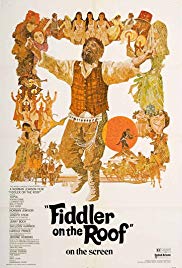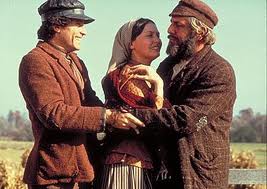1. See Discussion Questions for Use With any Film that is a Work of Fiction.
2. Why would Tevye continue to follow traditions when he didn’t know the reason for them?
Suggested Response:
The justification for most traditions are buried in the past. People follow them for several reasons. First, they believe that the traditional approach has worked in the past and don’t want to risk changing it. Second, tradition is often enshrined in religious belief and following the tradition is an affirmation of that belief. Third, traditions of a community are an affirmation of membership in that community.
3. Tevye talks about the importance of tradition but does he follow it most of the time?
Suggested Response:
No. Tevye puts love for his daughters ahead of tradition with the marriages of Tzeitel to Motel and Hodel to Perchik.
4. What was the significance of the fact that Perchik was sent to Siberia and Hodel went to accompany him?
Suggested Response:
It was far away. Life was very hard there. People often didn’t come back.
5. Remember the Rabbi’s blessing for the Czar: “May God bless and keep the Czar … far away from us.” Why did he say this?
Suggested Response:
The Jews of Anitevka saw the Russian government as oppressive and wanted as little to do with the government as possible.
6. What did the parents mean when, in the Sabbath prayer, they asked God to protect their children: to “Strengthen them, oh Lord! And keep them from the strangers’ ways”? Who were the “strangers” that the parents were referring to? Did something happen later in the story that related to this?
Suggested Response:
The strangers were the Christians, including the Christians who lived in their little village of Anatevka. The parents meant that they wanted their children to keep to the Jewish religion and traditions. In the story Chava rejects these so that she can marry Fyedka.
7. When everyone was drinking in the tavern, did you notice that Tevye was not sure whether he should dance with the Russians? Why was that?
Suggested Response:
There was a lot of hostility towards the Jews by the Russians. Tevye was afraid of being rejected.
8. What did America mean to the villagers?
Suggested Response:
America was the hope for a better life and more opportunity. They believed that in America hard work would be rewarded and the family would be free from the prejudices and pogroms of Russian society.
9. Do you think that when Tevye agreed to marry Tzeitel to Lazar Wolf, Tevye’s judgment was clouded because he had been drinking alcohol? We all know that alcohol makes people lose their coordination. What does drinking alcohol do to someone’s judgment?
Suggested Response:
Yes. People who are drunk have poor judgment.
10. Why did the Czar’s government incite the pogrom?
Suggested Response:
Pogroms were often secretly started by government officials when the government wanted to divert the public’s attention from other problems such as a poor economy, a new tax, etc. The Czar and his advisers wanted to divert the people’s anger at their dire circumstances away from the government, where it belonged, and let them vent their anger at the Jews.
11. Why did the villagers beat the Jews and destroy their homes?
Suggested Response:
The Jews were considered to be “aliens” and Russian society was very anti-semitic. The Jews were convenient targets on which the villagers could vent their frustrations.




